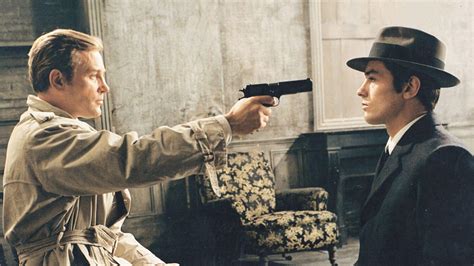Film Review: Le Samouraï

Icy and aloof, hitman Jef Costello enters a night club, surveys the room, smiles at the chic woman playing the piano, proceeds to the back office and shoots a man. We don’t know the reason for the hit and we never do.
The police are called and haul Jef and some others in for questioning and a line up. Some witnesses’ think Jef is the one and and others insist he isn’t. The piano player knows he did it, but tells the police he didn’t. Why does she do that?
Though Jef has ice water running through his veins, a beautiful redhead agrees to give him an alibi and she sticks to it. The police sense she’s lying but even when they ransack her apartment, she sticks to her story.
Jean-Pierre Melville’s classic Le Samouraï doesn’t feature any samurai’s. In fact, compared with Kurosawa’s or Tokuzo Tanaka’s samurai, you wonder what’s going on? Where’s his posse? Jef Costello is a loner par excellence, a ronin (i.e. a samurai without his feudal lord). Yes, up the chain Jef’s got a boss, but he has no idea who. We do. We see the big boss decide that someone needs to take Jef out. That plan goes awry because Jef’s that good. He’s unbeatable so the boss thinks maybe he is useful and should take on another contract.
The police investigator admires Jef’s impeccable skills, but is determined to win. Yet his network of detectives can’t catch the elusive Jef.
I haven’t seen a character this icy. He lives in near poverty in a dingy, gray apartment with a poor bird as his only companion. Even when he kisses significant other, no emotion registers. Yet he’s compelling.
Melville pares down the film to the minimum. Dialog is spare. Alan Delon, who plays Jef, took the role because when Melville pitched it to him, he realized there was no dialogue for the first 8 minutes. While it’s in color, the film mainly consists of grays, black and white. The only red is blood.
By using the elements of silent films, Le Samouraï compels because it’s so simple, so stark.



Comments
Post a Comment